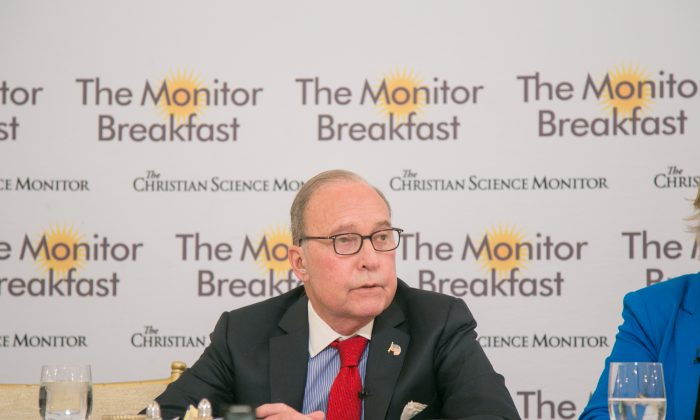
This happens to be extraordinarily good news. The reality is that China needs a fair bilateral intellectual property agreement as much as the USA. Their problem has been implimentation, not least in the face of a proactive military theft operation who has been happy to keep the politicians smoked. Reining all that in is long overdue.
Let us not presume that opportunistic generals represent either the State or anything approaching State interests any more than presuming General motors represent USA interests. We all have to sober up here and set out to establish working international norms of behavior that avoid this sort of nonsense.
Again Trump understands that and he also understands that getting there is a process. It he can get a great start and establish a working corrective process, then we will all win.
.
Kudlow: China Admits US Has ‘a Point’ in Trade Negotiations
Director
of the National Economic Council Larry Kudlow speaks to reporters at a
breakfast roundtable hosted by the Christian Science Monitor in
Washington, on April 3, 2019.
(Matt Orlando/The Christian Science Monitor)
April 3, 2019
Updated: April 4, 2019
WASHINGTON—The Chinese
regime for the first time admitted that the United States had “a point”
with respect to intellectual property theft, forced technology transfer,
and cyber hacking, said Larry Kudlow, the top White House economic
adviser.
“The Chinese have acknowledged these
problems for the first time. They were in denial,” he told reporters
April 3 at a breakfast roundtable hosted by the Christian Science
Monitor.
“I think that has led to good
negotiations,” he added. “This is the largest scale, deepest discussion
of trade between the two countries in history.”
Kudlow also said both sides made
headway during negotiations in Beijing last week. High-level trade talks
between the United States and China will continue this week in
Washington. China’s Vice Premier Liu He and his team would stay “for
three days or maybe more,” Kudlow said, adding that he hoped both sides
would get closer to a deal.
He said he saw the chemistry between
President Donald Trump and Chinese leader Xi Jinping during their
meeting on the sidelines of the G-20 Summit in Buenos Aires last
November.
Xi was acknowledging the problems at the meeting and was open to listening, Kudlow said, calling it “great progress.”
He also touted Trump’s negotiating style, saying “he was right.”
Last year, the Trump administration
chose to take a tougher stance on China’s decades-long protectionist and
trade-distorting policies, and instituted a tariff campaign. Some trade
experts criticized the president’s style, particularly his use of
tariffs and threats as a bargaining tool.
“The president, I think, has taught us all a lesson about being a tough negotiator,” Kudlow said.
“He is the first president ever to be
hard-headed with China and be unafraid to use tariffs to make his
point,” he noted. “It certainly has brought them to the table.”
Recent progress on the U.S.-China
trade deal has boosted both U.S and Asian equity markets. Asian stocks
rallied to seven-month highs this week. And the Shanghai index, which
fell nearly 25 percent in 2018 has gone up 27 percent since the beginning of 2019, after Trump voiced optimism about the trade talks.
Chinese
telecom company Huawei wasn’t part of the trade talks, according to
Kudlow. The U.S. Department of Justice announced criminal charges
against the company over the theft of trade secrets and fraud.
“The Huawei stuff has generally not come up in the trade talks,” Kudlow said. “We looked at it as a legal matter so far.”
Huawei’s Chief Financial Officer Meng Wanzhou was arrested in
Vancouver on Dec. 1, 2018, by Canadian authorities at the request of the
United States.
Southern Border
Separately, Kudlow spoke about a possible shutdown of the southern U.S. border.
He said the administration is
exploring various options to keep the freight lanes open to avoid
economic loss, should the border be closed.
When
asked whether he agreed with Trump’s suggestion that security was more
important than trade, Kudlow said both are essential and intertwined.
“I know it came out that way. But he knows they are intertwined,” he said.
He also defended Trump in his decision to close the border, saying that it sent a message to Mexico and the U.S. Congress.
“It is an exclamation point, it shows his seriousness.”
After the Fall of Maduro
Kudlow also discussed the
administration’s plan to revive the Venezuelan economy after the fall of
socialist dictator Nicolás Maduro.
He said the administration is working on developing an “extremely effective” rescue package after the replacement of Maduro.
People inside the government are
exploring “clever” ways to transfer dollars into Venezuela, using banks,
iPhones, applications, he said.
“It will be a rescue plan,
restructuring plan, it will be a plan to put cash into the country, into
the hands of people who are starving,” he said.
“We will be moving as fast as we can.”
No comments:
Post a Comment